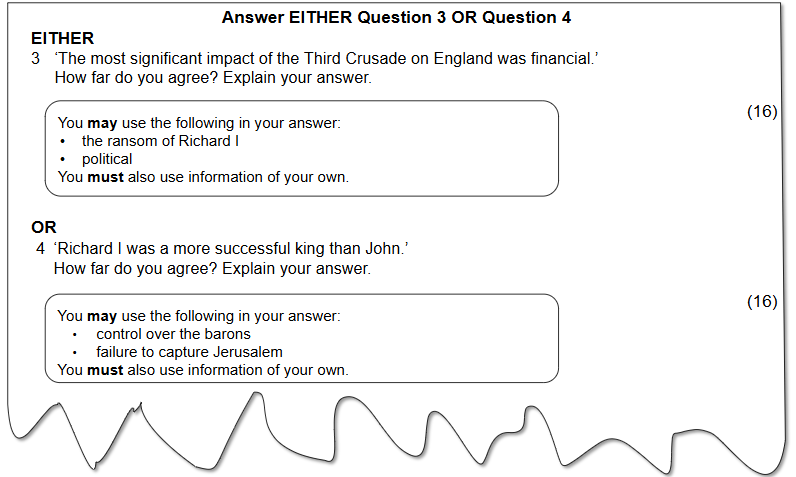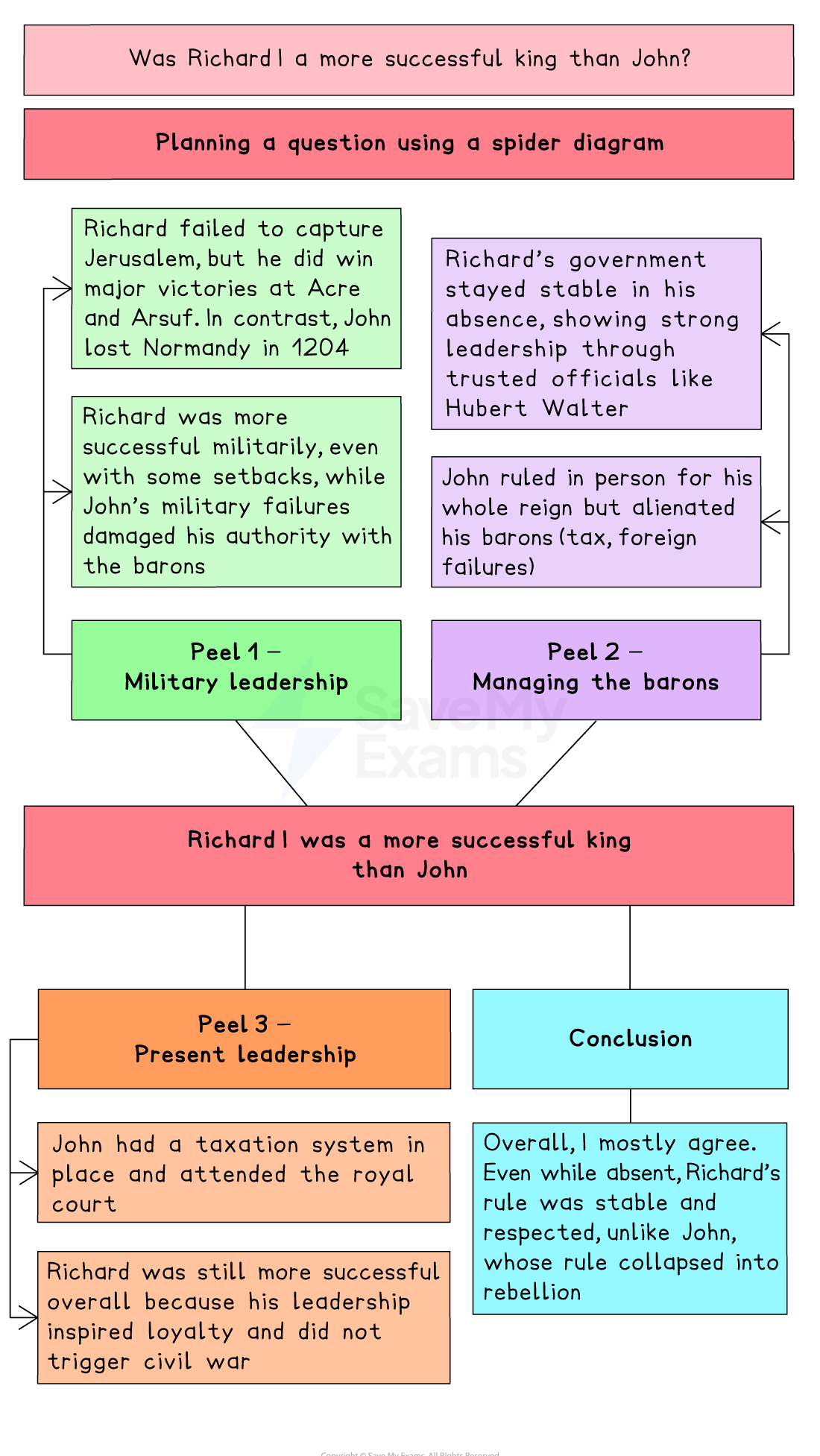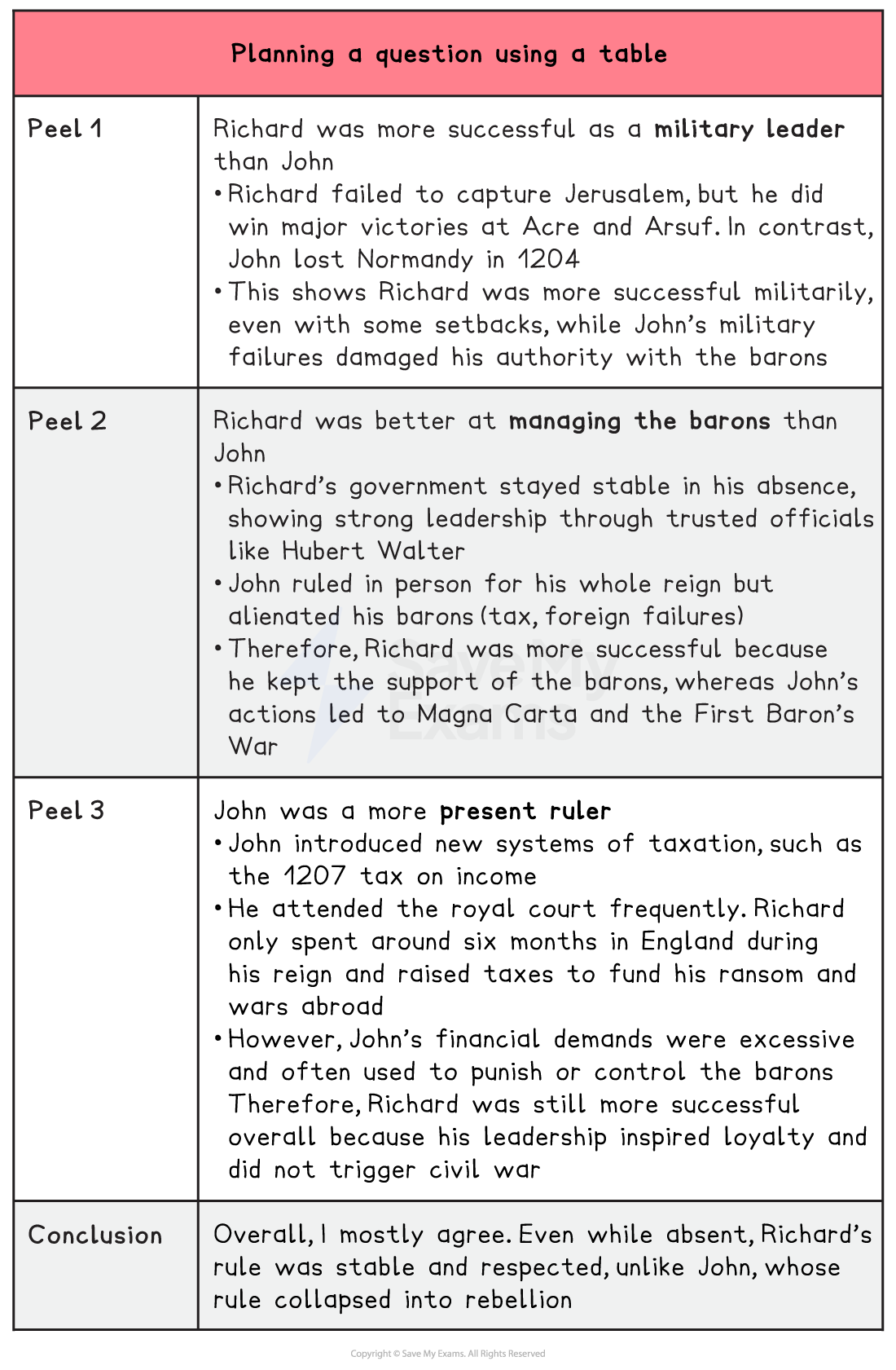The 16 Mark "How Far do you Agree" Question (Edexcel GCSE History): Revision Note
Exam code: 1HI0
Summary of Question 3 or 4
You will choose either Question 3 or Question 4
Answering either question requires you to:
Make a clear, sustained judgement about a historical statement
Use second-order concepts such as cause, change, significance or consequence
Compare the given reason with other valid reasons
Reach a well-structured conclusion
Unlike for the 16-mark question in Paper 1, you are not awarded marks for spelling, punctuation and grammar
Amount of marks | 16 marks |
|---|---|
The time that you should spend on the question | 5 minutes of planning 20 minutes of writing |
An example of the type of question you may encounter can be seen below:

In previous years, this question has focused on the following topics in the reigns of King Richard I and King John:
Year of Exam | Question Topic |
|---|---|
2018 (opens in a new tab) | Question 3: Richard’s poor leadership in the failure to recapture Jerusalem Question 4: The invasion by Prince Louis as a problem for John |
2019 (opens in a new tab) | Question 3: Reasons for joining the English crusading army Question 4: Reasons for John's worsening relationship with the barons, 1209–14 |
2020 (opens in a new tab) | Question 3: Religion as a motive for King Richard I’s involvement in the Third Crusade Question 4: The succession as the main problem facing England when King John died |
2021 (opens in a new tab) | Question 3: Knight service and the king’s control of England Question 4: Disputes with Pope Innocent III and John’s unpopularity in England |
2022 (opens in a new tab) | Question 3: Consequences of the Third Crusade Question 4: John’s failure to regain Normandy in 1214 as the main reason for the rebellion of 1215 |
2023 (opens in a new tab) | Question 3: Similarities in the governments of John and Richard I Question 4: Religion as the main reason for supporting the crusaders |
2024 | Question 3: Acre as Richard I's main achievement during the Third Crusade Question 4: King John’s financial demands as the main reason for his difficult relationship with the barons, 1199–1214 |
Making judgements in history
The 16 mark question requires you to weigh all the evidence and make a decision
Students often find this part the hardest to do
Common mistakes in judgement questions
Explaining that all of the reasons are the most important
Avoiding a clear decision by using phrases like “kind of” or “maybe”
Giving no opinion
Changing your argument halfway through
In the example question, you state in the introduction that Richard I was the better king
However, in the conclusion, you state that John was the better king
Doing this means that there is not a sustained judgement, and you cannot access Level 4 (13–16 marks)
What makes a good judgement?
Clearly answer the question using second-order concepts
Acknowledge other sides of the argument
Have a consistent judgement from start to finish
Use your best evidence to back up your decision
There is no "right" or "wrong" answer in history
Consider other reasons
Even if you fully believe a reason is the most important, you still need to present evidence for other reasons
What makes a great conclusion in GCSE History?
Conclusions are usually where most of your judgement marks will be awarded
All great conclusions have these three elements:
Judgement — State your opinion using words from the question
Counter — Mention a reason from the other side
Support — Use your strongest evidence to explain why your side is more convincing than the other
How to answer a "How far do you agree?" question
In the exam, only answer Question 3 or Question 4
You should put an "X" in the box next to the question you have chosen to answer

You will receive two stimulus points
These are areas of knowledge to discuss in your question
If you only discuss these two stimulus points, you are limited to a maximum of 11 marks
You can choose not to use any of the suggestions
You can still achieve full marks by not using the two stimulus points
You must discuss three areas of knowledge in your answer to access Level 4
To answer this question successfully, you should:
Read the answer carefully and multiple times
Annotate the question to find the key demands of the question
Plan your answer, including:
What your judgement is
The key knowledge you wish to use


"How far do you agree?" question structure
Your answer should include:
A logical structure
A range of specific and relevant knowledge
An explanation of the second-order concept outlined in the question
A clear and sustained judgement throughout the answer
A conclusion
If you want to include an introduction you can, but it is not necessary
Your answers could be written in PEEL paragraphs:
P — Make a point about the question
This should include your judgement
E — Use evidence that supports the point that you have made (K)
Evidence needs to be relevant and specific to the question
E — Explain why this evidence supports your point
Your explanation should be focused on the second-order concept outlined in the question (SOC)
L — Link your explanation back to the question to help sustain your argument and show your understanding of the question
The question is out of 16 marks:
6 marks for a wide range of specific knowledge of the period and the topic stated in the question (K)
10 marks for the analysis of the key second-order concepts of cause and consequence, similarities and differences, and importance (SOC)
Worked example of a "How far do you agree?" question
Worked Example
"Richard I was a more successful king than John."
How far do you agree? Explain your answer.
(16)
You may use the following in your answer:
You must also use information of your own. |
Answer:
I agree that Richard I was more successful than John because of his military achievements and stronger relationship with the barons, even though John was more present in England.
Richard I was more successful than John in military leadership. Although Richard failed to capture Jerusalem during the Third Crusade, he won important battles such as Acre and Arsuf, and he agreed to a peace treaty with Saladin that allowed Christian pilgrims to enter the city (K). These victories gave Richard a strong reputation across Europe as a brave and skilled warrior (SOC). In contrast, John had several military failures, especially the loss of Normandy in 1204 (K). Losing these lands damaged John’s reputation and power. This shows that Richard was more successful because his military actions earned respect, while John’s defeats caused a loss of trust and territory (SOC).
Richard I was also better at managing the barons. Even though he spent most of his reign abroad, he chose loyal and capable officials, such as Hubert Walter, to run the country in his absence (K). This helped keep the barons loyal and the country stable (SOC). John, on the other hand, ruled in person but was often harsh and unfair. He demanded high taxes and punished barons without trial, resulting in him losing their support (K). This led to the rebellion in 1215, Magna Carta and even a civil war. This shows that Richard was more successful at keeping control, while John’s actions led to serious conflict (SOC).
However, John was a more present ruler than Richard. He introduced new systems of taxation, such as the 1207 tax on income, and he often attended the royal court in person. Richard only spent around six months in England during his reign and raised taxes to fund his ransom and wars abroad (K). However, John’s financial demands were often seen as unfair and were used to punish barons. His high taxes and fines increased anger and led to rebellion. Therefore, Richard was still more successful overall because his leadership inspired loyalty and stability, while John’s style of rule caused division and civil war (SOC).
I agree that Richard I was more successful than John, especially in military leadership and control of the barons. Some may argue that John was more involved in ruling the country and tried to improve royal finances and justice (K). However, Richard’s victories and the loyalty he gained, even while being absent, show that he was more respected, and he avoided civil war. This clearly makes him the more successful king overall (SOC).

Unlock more, it's free!
Was this revision note helpful?
